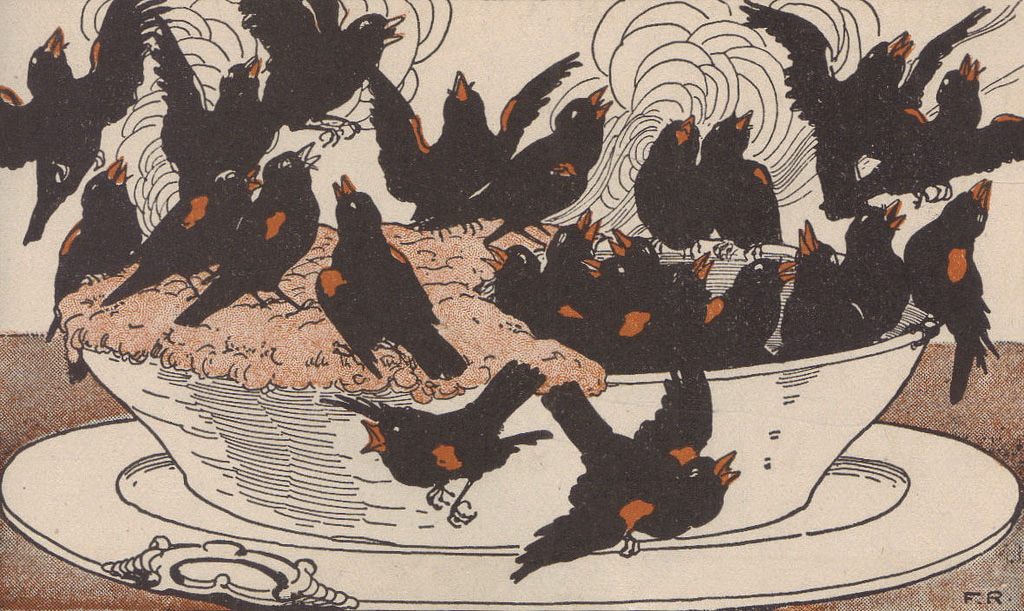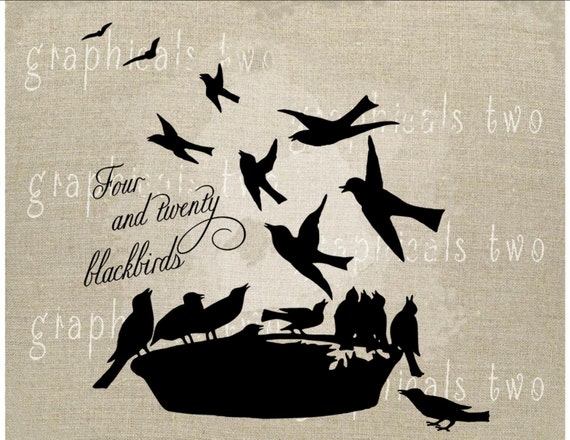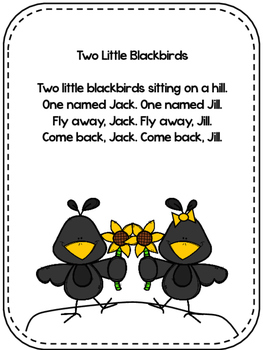The Butcher, The Baker, The Candlestick Maker

A few weeks ago, while I was going about my business, a thought came into my head. Not as uncommon as it might sound, but it was a fairly momentous thought, nevertheless. The thought concerned the nursery rhyme, “Rub A Dub Dub”, which involves three men: a butcher, a baker, and a candlestick maker. The version of the rhyme which I remember from my childhood went something like this (pulled from a Wikipedia page).
Rub a dub dub,
Three men in a tub,
And who do you think they be?
The butcher, the baker,
The candlestick maker.
They all sailed out to sea.
Sing a Song of Sixpence Lyrics: Sing a song of sixpence / A pocket full of rye / Four and twenty blackbirds / Baked in a pie / When the pie was opened / The birds began to sing / Wasn't that a. The rhyme was first recorded when published in Mother Goose's Melody in London around 1765. In this version the names of the birds were Jack and Gill: There were two blackbirds Sat upon a hill, The one was nam'd Jack, The other nam'd Gill; Fly away Jack, Fly away Gill, Come again Jack, Come again Gill. Nursery rhymes are a fun way to teach your children about music, rhyme and language. Four and twenty blackbirds baked in a pie. When the pie was opened, the birds.
- This nursery rhyme is very popular today - as it has been for almost 300 years. It originates from England, but it is also used in USA. Do you remember it from your own childhood? Don't you remember the Sing a Song of Sixpence tune?
- (Variants of the rhyme give ‘snipped’ for ‘snapped’ in that final line; some give ‘pecked’; while the penultimate line is sometimes rendered as ‘Along came a blackbird’. The above version is taken from Iona and Peter Opie’s The Oxford Dictionary of Nursery Rhymes (Oxford Dictionary of Nusery Rhymes).).
You are correct in deducing that this is, indeed, quite a random thought. Fortunately, such thoughts come into my head just often enough to keep my life reasonably interesting. The odd thing about this particular random thought is that I hadn’t thought of that particular rhyme for years, and the only portion I remembered was the line, “The butcher, the baker, the candlestick maker.” Even more amazing is the fact that, after the thought entered my head, I automatically attempted to fabricate some underlying and philosophical meaning to account for the seemingly disjointed nature of the rhyme.
This is what I realized:
Throughout history there have been three kinds of people necessary in order to facilitate major change in any given society. The “butcher” is the person willing to take whatever action necessary, despite the implications or nature of the act, in order to cause or further change. The “baker” is the person who takes what he has, despite how little or how much that may be, and uses it to support the others in the cause. And last, but by no means least, the “candlestick maker” is the person who illuminates the darkened path leading to change, and who keeps a beacon of light constantly burning to light the way for others to follow.
It’s interesting, isn’t it? All that from a phrase that popped into my mind while standing in my living room one day. Some people might say that I read too much into things.
I disagree with them.
Many of us fondly recall the rhyming ditties we learned as children, such as “Jack Be Nimble” and “The Farmer in the Dell.” But how many of us realize that several of our most fondly-recalled nursery rhymes (e.g., “A Tisket, A Tasket” and “Little Jack Horner”) were not mere nonsense songs, but actually originated as coded references to such dark events as plagues and religious persecution? Such was the case with another childhood favorite, “Sing a Song of Sixpence.”
For those unfamiliar with this ditty, let’s start by offering its lyrics:
Sing a song of sixpence
A pocket full of rye
Four and twenty blackbirds
Baked in a pie
When the pie was opened
The birds began to sing
Was that not a tasty dish
To set before a king?
The King was in his counting house
Counting out his money
The Queen was in the parlor
Eating bread and honey
The Maid was in the garden
Hanging out the clothes
When down came a blackbird
And snapped off her nose!
Blackbird Nursery Rhyme Lyrics
The surprising truth is that this innocent little rhyme, which dates from the early 1700s, actually represents a coded message used to recruit crew members for pirate vessels!
Pirates (or corsairs, privateers whose activities were sanctioned by letters of marque from a sovereign) did not spend all their time at sea: they cruised the waters in areas such as the Mediterranean, the Spanish Main, or the Atlantic coast of North America, looking for prizes, and they returned to port when the need for supplies or repairs demanded it. Upon reaching port, the ship’s captain paid off the crew (primarily by dividing the spoils of whatever they had captured), and the crew members then dispersed ashore (usually to spend all their pay on alcohol and prostitutes as quickly as possible). Some crewmen tended to stay in the vicinity, but others left for other regions, caught on with other ships, died, were killed, or simply disappeared. Thus, much like the captains of naval vessels and merchant traders, the captains of pirate ships needed to recruit new crew members whenever they embarked on yet another venture. Since piracy (as opposed to privateering) was against the law, pirates devised codes that could be used to advertise for crew members without openly revealing their illegal affiliations.
The nursery rhyme “Six a Song of Sixpence” was a coded message that evolved over several years’ times and was used by confederates of the notorious pirate Blackbeard to recruit crew members for his prize-hunting expeditions. Like many other messages passed down to us over hundreds of years by oral tradition, there is no one “official” version, nor is there a “correct” interpretation for any particular variant. In general, however, the most common form of this rhyme bore these veiled meanings:
Sing a song of sixpence / A pocket full of rye
Blackbeard’s standard payment of sixpence a day was considered good money in the 1700s, especially since most pirate vessels did not pay a salary: the crew only received a share of the spoils if they were
successful in capturing prizes (and many a pirate ship had to return to port empty-handed after spending several fruitless months at sea). As well, his crew was promised a pocket (a leather bag somewhat like an early canteen which held about a liter) full of rye (whiskey) per day. Not bad, considering that alcohol was the average sailor’s raison d’etre.
Four and twenty blackbirds / Baked in a pie
As Henry Betts points out in his book on the origins and history of nursery rhymes, “It was a favourite trick in the sixteenth century to conceal all sorts of surprises in a pie.” Buccaneers, too, were fond of surprises, and one of Blackbeard’s favorite ruses to lure a ship within boarding range was to make his own vessel (or crew) appear to be in distress, typically by pretending to have been dismasted in a storm or to have sprung a leak below the waterline. Passing ships — both honest sailors wanting to help and other pirates looking for an easy catch — would sail in close to offer assistance, whereupon a crew of two dozen heavily-armed seamen dressed in black would board the other vessel (via a boat in darkness or fog, or by simply jumping into the other ship when it came alongside if no other means of surprise attack was possible) to quickly kill or disable as many crew members as possible. Thus the four and twenty “blackbirds” (i.e., Blackbeard’s crewmen) “baked in a pie” (i.e., concealed in anticipation of springing a trap).
Blackbird Nursery Rhyme Song
When the pie was opened / The birds began to sing
This follows from the previous line. Once the victim’s ship was lured in for the kill, the “blackbirds” came out of hiding and attacked with a fearsome din.
Was that not a tasty dish / To set before a king?
Four And Twenty Blackbirds Pies
This line is commonly misinterpreted. The King is not a reference to any real king, but rather to Blackbeard himself, the king of pirates. And the tasty dish is the plundered ship that was so easily captured.
The King was in his counting house / Counting out his money
Again, the King is Blackbeard (no real king would take on such a mean task as counting money). This line of the message signals that Blackbeard had the cash on hand to pay a crew on salary rather than strictly on divided spoils.
The Queen was in the parlor / Eating bread and honey
Blackbeard’s main vessel was a French merchant ship named “Le Concorde de Nantes” that was jointly captured by Blackbeard and Captain Hornigold in the Grenadines in November of 1717. Upon his retirement from pirating, Hornigold presented the ship to Blackbeard, who renamed it “The Queen Anne’s Revenge”. Thus the “Queen” referred to here is Blackbeard’s ship, and “eating bread and honey” meant that it was in port taking on supplies in preparation for a cruise.
Blackbird Pie Nursery Rhyme
The Maid was in the garden / Hanging out the clothes
The use of the word “maid” indicated that the location/route of one or more prize ships was known, and they were going to be specific targets of the upcoming cruise (this greatly enhancing the probability of the crew’s collecting prize money). The waters around the Carolinas down to the Caribbean were referred to as the garden, as this was an area where pirates would often cruise for easy pickings. “Hanging out the clothes” meant the targeted ship was already at sea or just about to leave port (thus its sails — or “clothes” — have been hung).
When down came a blackbird / And snapped off her nose!

There is some scholarly debate in literary and maritime circles as to whether the last part was originally “and snapped off her nose” or “and snapped off a rose.” Either way, the passage is taken to be a Blackbeard’s bragging about his plans to swoop in and have his way with the targeted ship.
So, next time you hear this innocent children’s song, remember that it was originally recited in taverns by drunken, bloodthirsty buccaneers as a code to recruit other pirates for their next murderous voyage!
Additional information:

More information about this page
